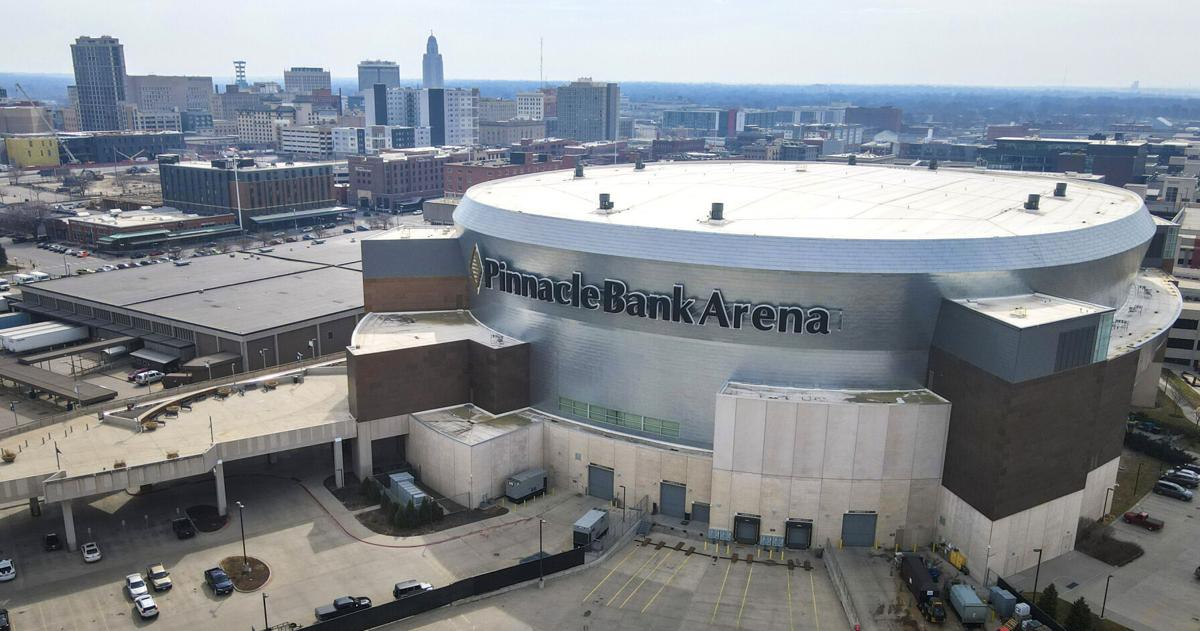
There’s something special about Selection Sunday.
It’s when the magic of March Madness officially begins — teams watching the TV broadcast, finding out where they’ll be beginning their quest for eternal glory.
Some teams tuning in to find out where they’re headed are perennial postseason mainstays, while other schools haven’t seen their name printed on the NCAA Tournament’s bracket in decades.
For the men’s teams making this year’s dance, their journeys will begin in Salt Lake City, Spokane, Omaha, Memphis, Indianapolis, Brooklyn or Charlotte.
Three or four years from now, teams punching their postseason tickets might be jumping for joy ahead of booking their travel to Lincoln.
The University of Nebraska has put in a bid to host the first and second rounds of the men’s NCAA Tournament in 2027 or 2028, according to conversations the Lincoln Journal Star has had with officials from Nebraska Athletics, Visit Lincoln and Pinnacle Bank Arena.
People are also reading…
The University of Nebraska has put in a bid to host the first and second rounds of the men’s NCAA basketball tournament in 2027 or 2028 at Pinnacle Bank Arena.
KENNETH FERRIERA, Journal Star
“We need to do this,” said Matt Davidson, Nebraska’s associate athletic director of event management and operations. “We’re very well-positioned to do it. It almost felt a little silly that we hadn’t done it earlier.”
“It was really a conversation to say, ‘Hey. Why not us?’” said Tim Savona, the general manager of Pinnacle Bank Arena. “We felt, collectively, like we’re ready to take a run at this, so let’s give it our best shot.”
“We assumed forever that we just didn’t have enough full-service hotels to do a bid,” Davidson said. “This has been something, honestly, I’ve been wanting to do for a while. And we had some barriers that we, honestly, once we started looking into them, we’re like, ‘Oh. That’s a little bit of a myth.’ We can actually bid on this.”
Nebraska hasn’t hosted the first and second rounds of the men’s NCAA Tournament since 1988 when No. 6 seed Kansas started its run to the school’s third NCAA Tournament title from the hardwood at the Bob Devaney Sports Center.
Since then, the bid process to host NCAA events has changed radically.
The NCAA’s bid specifications document for the preliminary rounds for the two-year bid cycle of 2027 and 2028 is 82 pages full of specific requirements. The application consists of roughly “100 forms” that potential hosts have to upload as a part of the process.
“We’re proud of what we put out there, but at the same time, know that it’s a highly competitive process,” Savona said. “I don’t remember the exact stats but in one of the meetings somebody shared that hundreds of these bids go in and only X amount are allocated, so it’s pretty competitive.”
What it takes
There are 17 pieces of broad criteria the NCAA looks for when it selects tournament sites.
The widely discussed aspects are hotels, airport access, financials and attendance, but some other lesser-known criteria would, in theory, make Nebraska a competitive candidate.
For example, page 48 of the specifications document says “consideration may be given to a host or competition venue that has not hosted the tournament most recently.”
But to even be up for consideration, Nebraska has to do the research and fill out the bid paperwork, and no detail is overlooked.
The venue requirements alone span 30 pages, let alone account for the pages upon pages of requirements for what the host institution is responsible for, both personnel-wise and financially. There’s a lengthy section regarding event marketing and expectations, too.
“There’s a laundry list of guidelines that we have to follow,” Davidson said. “Sometimes those change. Sometimes they’re more of just a guideline than an actual binding principle that we have to follow before we can bid. Sometimes you can get lost in those and assume certain things.
Savona estimates that he, Davidson, Derek Bombeck, director of sports for Visit Lincoln, and Nebraska’s Director of Championships and Security Operations Derek Bond spent six to eight weeks meeting “pretty frequently” to work on the bid process in advance of their submission.
“Everybody played a significant role in it because there’s so many layers to the bid,” Savona said. “This thing is so large in scope we really had to dive into the details. And the one thing is, it’s a gift that’ll keep on giving. There’s a lot of stuff in there that it’ll be — once you do it once, you’re able to recycle it a little bit more. So as we look to the future opportunities that arise in whatever sport it may be, the exercise was really beneficial in that regard.”
Lodging requirements
The NCAA’s bid specifications document stipulates that first- and second-round host sites must have at least eight full-service hotels — lodging that has room service, on-site catering and meeting space.
However, upon further conversation, the NCAA does give a little wiggle room there.
“They ask for eight, but not necessarily. That’s their preference,” said Bond, who also oversees Nebraska volleyball’s bid processes for both its annual postseason appearance and for when the Final Four is in Omaha. “That way each team can have their own full-service hotel. But if your hotels are large enough where you can put two teams in each, they don’t necessarily require that for the first and second rounds. They look at the total package of your bid.”
Lincoln currently has six hotels that Visit Lincoln considers to be full-service, with a seventh that’s in the process of being built.

This drone shot of downtown Lincoln and the Haymarket shows the site of the former Lincoln Journal Star production building, which will be the location of a 252-room Drury Plaza hotel. Also shown in this shot are the Embassy Suites and the Graduate Lincoln hotel, two other full-service downtown hotels, as well as the Hilton Garden Inn and Courtyard By Marriott. The number of hotel rooms is one facet the NCAA considers when choosing where to award bids for the first and second rounds of the NCAA men’s basketball tournament.
KENNETH FERRIERA, Journal Star
Of those six, the Cornhusker, the Graduate and the Embassy Suites are all conveniently located in the Haymarket and/or greater Downtown area and have at least 230 rooms.
Lincoln’s other three full-service hotels are the Country Inn & Suites North on North 27th Street near Folkways Boulevard, the Holiday Inn Southwest on South 27th Street near Pine Lake Road and the Scarlet at Nebraska Innovation Campus.
The seventh, the announced Drury Hotel that will be built where the Lincoln Journal Star’s production facility used to be, was included on Nebraska’s bid paperwork. However, the Drury was included with an asterisk because it’s not finished yet. It is, though, expected to be completed before the spring of 2027 — the first year that Nebraska bid for, Bond said.
Once completed, the Drury is set to stand eight stories tall and feature 252 rooms with a restaurant and lounge, meeting facilities, an indoor pool and a fitness center.
Having other limited-service hotels, like the Hyatt, the Courtyard Marriott, the Hilton Garden Inn and the Holiday Inn Express, in and around the Haymarket also helps with Nebraska’s bid.
“I work closely with Omaha, and they’ve obviously been in multiple NCAA basketball tournaments. They go, ‘No, we use limited-service properties, too,’” Bombeck said. “As long as they have a meeting space that can hold a team and allow food service to come in and feed the team, that’s pretty much all they’re expecting out of a property. The actual need to have a restaurant on site is not as necessary as it maybe once was in the past.”
Other limited-service hotels are also being constructed, including a 104-room Hampton Inn in the former Gold’s Building at 11th and O streets and a 122-room six-story Residence Inn by Marriott at Ninth and R streets.
When all the currently planned lodging projects are said and done, Bombeck said there will be “just under” 6,000 hotel rooms in Lincoln.
Venue qualifications
For starters, all arenas must have a minimum capacity of at least 10,000, though the NCAA can give preference to venues that have larger capacities.
Pinnacle Bank Arena’s capacity is 15,500. For context, the CHI Health Center, in Omaha, has hosted five NCAA Tournament events since 2008, and has a capacity of 17,560.

Fans pack Pinnacle Bank Arena on March 3 for the Nebraska men’s final home game of the season against Rutgers. If the university’s bid is successful, fans could pack the arena in three or four years to watch first- and second-round NCAA tournament games.
KATY COWELL, Journal Star file photo
But the venue qualifications go beyond mere capacity.
There are required specs detailing everything from mandating that all video board systems have Windows 10 or newer operating software to the number of input and output channels to the color of the topping and skirting colors of courtside tables to the power requirements for the press conference production.
As far as “General Facility Requirements” are concerned, there are 18 categories with double-digit numbers of even more specific criteria.
Those pertain to everything from venue availability to seating and tickets to the playing surface, to required basketball equipment, to locker rooms, to catering, to electrical requirements. There are outlined criteria for hardline internet, broadcast rights, media coordination, game programs, required signs and banners, concessions, insurance, additional financial arrangements, among other things.
For example, a line item in the criteria stipulates that the four locker rooms must have “a minimum of four showers and four toilets” and “unbranded towels, soap, a large, portable dry-erase board and markers…”
Those in charge of submitting the bid aren’t worried about the feasibility of that.
“The building is built for basketball and it’s certainly an adequate facility to host,” Savona said.
In an interview conducted on Feb. 27, then-Nebraska athletic director Trev Alberts agreed.
“PBA is a really, really well-thought-out facility,” Alberts said two weeks before his departure for Texas A&M. “When that place is full, it is such a great environment. The sight lines are really good, the vertical nature of the fans, the noise is great. I think PBA can be electric — not that every place can’t be — but it’s really well done.”
Fortunately for Nebraska, the feedback the Athletic Department has received over the years when hosting games or big events has been overwhelmingly positive. Take the Big Ten Wrestling Championships that Nebraska hosted in 2022, for example.
“I got a lot of really positive feedback from our partners in the Big Ten and the NCAA just about how well–run it was, how it was,” Alberts said.
If Nebraska wins the bid to host, the Huskers cannot play in Pinnacle Bank Arena if they make the NCAA Tournament, just like how Creighton has to hit the road whenever CHI Health Center is a tournament venue.
However, the level of fan support Nebraska has shown over the years for men’s basketball games does help Nebraska’s bid, as one of the evaluation criteria outlines that “the committee will consider community interest.”
“This place is one of the hardest places to play in the league,” Minnesota coach Ben Johnson said on Feb. 25. “I think they do a really good job of feeding off the crowd and the energy in here.”
The Haymarket’s advantage
The trio of Nebraska, Visit Lincoln and Pinnacle Bank Arena are optimistic the Haymarket will help set their bid apart.
It’s not uncommon for tournament arenas to be great but the community infrastructure around the playing venue to be lacking ample restaurants and bars within walking distance.
With the Haymarket, Lincoln doesn’t have that problem.
The Haymarket District features more than 200 businesses, according to Downtown Lincoln’s directory, with more than 30 places to dine. And that doesn’t count the amenities on the other side of Ninth Street.
“What really brings a wow factor to this place is the downtown, Haymarket and The Railyard,” Davidson said. “It’s right outside the front door. I’ve been to enough postseason to where you go into the venue, great experience, you’re there because you like whatever sport you’re watching. And you leave and ride-sharing somewhere, maybe back to your hotel, maybe just to go to a bar or restaurant. Here, everything is just right there. I think that’s the biggest value.”
Bombeck added: “I get to travel all across the country, and I always say we have one of the most vibrant and exciting downtown areas that I’ve been to. There’s just so many restaurants, shops, bars, attractions, hotels, all in one walkable area and it’s very safe and clean.”
Logistical challenges
The biggest knock, for both Davidson and Bond, is that there isn’t a convention center connected to Pinnacle Bank Arena. That, they say, adds some logistical challenges to being able to host — but doesn’t make it impossible.
If Nebraska does win the bid to host, teams would likely practice at the Hendricks Training Complex inside the Bob Devaney Sports Center — a 1.6-mile drive from Pinnacle Bank Arena.
“It’s a nice venue, good back-of-house, but there’s no practice venue that you can go to,” Davidson said. “There’s no large convention area that you can utilize to help support that championship.”
Bond added: “One of the advantages that those places have is just the additional space whether it’s meeting room space, banquet space if teams wanted to eat. That’s probably your biggest challenge. We are lucky that the practice courts are fairly close because other venues, we have to drive those teams around the city to find those alternate practice areas.”
A new convention center is coming to downtown Lincoln, but the exact location has yet to be decided. As of earlier this month, four architect-design groups have submitted proposals to Assemble Lincoln, the committee created to oversee the convention center process. That deadline was March 1.
In December, four potential sites had expressed interest. The locations of those were at Canopy and Q streets, at 14th and M streets, at 20th and Q streets, and at 10th and N streets where the south half of the Gold’s Building used to be.
In a perfect world for Pinnacle Bank Arena and Nebraska Athletics, a convention center would be built at Seventh and R streets where the downtown Post Office is.
“Do you know how much that would increase the stock and the value of PBA for postseason championships if the convention center was there and there’s a bridge over to the arena?” Davidson said. “Unreal.”
The Post Office location was originally tapped as a potential convention center site in 2022, but a big question remains: whether the federal government would want to sell that prime real estate.
What it all means
If Nebraska were to win the bid to host the first and second rounds of the men’s NCAA Tournament in either 2027 or 2028, it would be a windfall for the Lincoln economy.
What goes into that figure? Think of anything associated with fans attending a game anywhere: hotel rooms, restaurants, bars, ticket sales, concessions, shopping foot traffic, etc.
Visit Lincoln hasn’t run the projected numbers yet as to what this could do for Lincoln, and Alberts used the word “significant” rather than sharing a dollar figure, but they don’t have to look far to see what the event has done for other cities.
Visit Omaha projected that the 2024 NCAA Tournament would bring in $7 million for the economy, Deb Ward, the executive director of Visit Omaha told WOWT-TV. When Columbus, Ohio, hosted in 2023 the city’s tourism arm projected $9.3 million would be spent in their area, according to Columbus Business First.
An average home Nebraska football game in Memorial Stadium has an economic impact of $12.2 million, the Athletic Department has previously told the Journal Star. Using the same formula, the estimated economic impact of Volleyball Day in Nebraska was approximately $10 million.
“With something like this, you don’t know exactly the precise number of out-of-town visitors you’re going to have versus local attendees you’re going to have,” Bombeck said. “That just changes the variable on the economic impact. We know we’d be a very desirable destination for those attending that ticket sales would be excellent. The press we would get nationally and the focus on Lincoln would be well worth our bid.”
Lincoln won’t find out until October 22 if its bid to host was successful.
So until then, they wait. And hope for good news — knowing it’s one of the most coveted hosting opportunities for NCAA events.
“To have that in our own backyard of Lincoln, it would bolster the light of who Lincoln is and what we’re about, not only the University of Nebraska, but our community and everything that we have going for it as well,” Bombeck said. “It would be an excellent step forward for us.”
Check out the scene at Pinnacle Bank Arena as fans celebrate with Nebraska players after defeating No. 1 Purdue on Tuesday, Jan. 9.
- • Texts from columnists
- • The most breaking Husker news
- • Cutting-edge commentary
- • Husker history photo galleries
Be the first to know
Get local news delivered to your inbox!

Must See
-
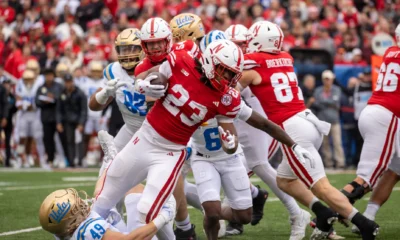

Football
/ 2 months agoHuskers Fight Hard but Fall Short Against UCLA
LINCOLN – The Nebraska Cornhuskers gave it their all on Saturday, with standout efforts...
-
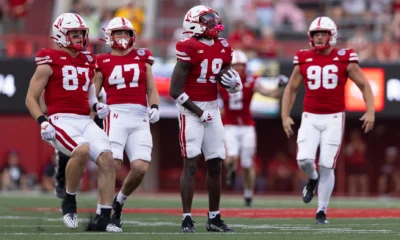

Football
/ 2 months agoGAMEDAY: Nebraska Set to Face Undefeated Indiana in Key Big Ten Showdown
Bloomington, IN – It’s Game Day, Husker Nation! Nebraska (5-1, 2-1 Big Ten) returns...
-
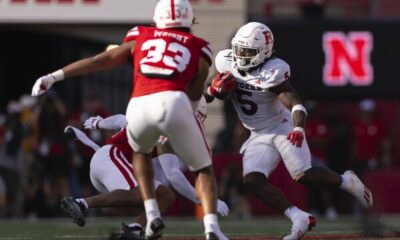

Football
/ 3 months agoBlackshirts Shine as Nebraska Tops Rutgers 14-7 on Homecoming
Lincoln, NE – Nebraska’s Blackshirt defense played a starring role in the Huskers’ 14-7...
By Chris








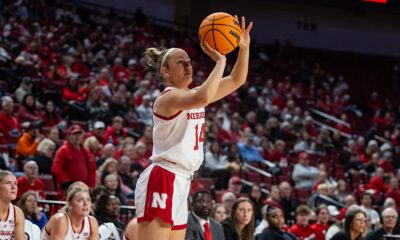

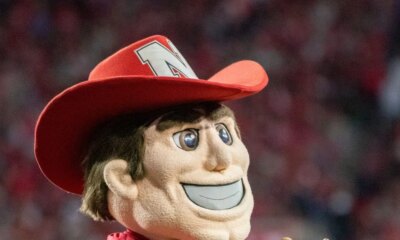

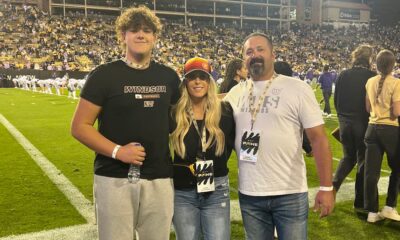

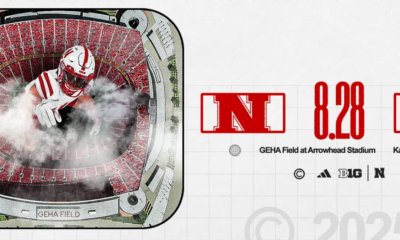

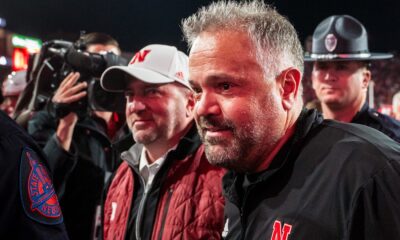




You must be logged in to post a comment Login